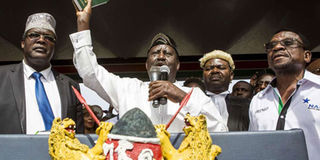You can arrest people but can’t block idea whose time has come

National Super Alliance leader Raila Odinga swears himself in as the 'people's president' on January 30, 2018 at Uhuru Park in Nairobi. ANC claims the event was secretive. PHOTO | PATRICK MEINHARDT | AFP
What you need to know:
- Interior Cabinet Secretary Fred Matiang’i banned the Raila Odinga-led Nasa’s National Resistance Movement.
- Raila remains a symbol of what his supporters aspire for – a country free of dictatorship, where everyone has an equal chance in life.
In this era of fake news, where “optics” (perceptions) matter more than reality, it is not surprising that the Jubilee government panicked when it saw thousands of people gather at Uhuru Park, Nairobi, to “swear-in” the ‘People’ President’, Raila Odinga, on January 30.
As the Nation reported, the event was “the greatest sign of political defiance ever seen in modern Kenya”.
An insecure government whose power rests on shaky ground cannot tolerate such acts of mass rebellion, and so, three major news channels – NTV, Citizen and KTN – were shut down, apparently because they defied an order from the President not to air the ceremony live.
MEDIA SHUTDOWN
Instead of condemning this action as unconstitutional and against the freedoms enshrined in the United Nations Charter, the international community – notably the UN and the Western governments – remained rather mute.
For them, a people-driven democracy is probably more threatening than one that is the result of a disputed election.
Jubilee supporters such as the inimitable Mutahi Ngunyi, were ecstatic about the media shutdown.
“We have 43 TV stations or so in Kenya,” he tweeted.
“If you shutdown three stations, how is that a media clampdown? Government should shut them down forever. Kenya is happier without their acidic pessimism.”
NYAYO ERA
It is hard to believe that we are now in the same place we were three decades ago, when Daniel arap Moi and his henchmen muzzled the media through the threat of imprisonment or torture, and when journalists such as Wahome Mutahi were picked up on trumped-up charges and jailed.
Now, NTV’s Linus Kaikai, Larry Madowo and Ken Mijungu and many others could face the same fate.
While Western countries hesitated to condemn this blatant violation of press freedom, their media and human rights organisations were quick to criticise the government’s action.
“Kenya should be a beacon on the continent for media freedom and the public’s right to access information, yet government censorship continues to erode Kenya’s status as a leader on African press freedom,” Committee to Protect Journalists’ Africa coordinator Angela Quintal said.
NRM BANNED
Interior Cabinet Secretary Fred Matiang’i banned the Raila Odinga-led Nasa’s National Resistance Movement, which he described as “an organised criminal group”, placing it in the same category as Al-Shabaab and other proscribed organisations.
Spokesperson Mwenda Njoka stated that this designation was “based on evidence that the government had seen but did not plan to share” that linked the group to armed activity. (Lest we forget, the Mau Mau remained proscribed throughout the Kenyatta I and Moi regimes. The ban on the liberation movement was only lifted in 2003, after President Mwai Kibaki took office.)
Thankfully, no one died or was injured last Tuesday, largely because the security forces were ordered to keep off the venue, which goes to show that when people are allowed to do their thing, protests can be peaceful.
POLITICAL DEFIANCE
The January 30 event demonstrated that there is a large section of the population that is willing to defy the government to make a point.
Whichever way you look at it, the so-called “swearing-in” was more of a symbolic rather than literal act.
As “The People’s President”, Raila has neither the military nor the administrative authority to carry out any functions.
Like the jailed Nelson Mandela was to the people in apartheid South Africa, Raila remains a symbol of what his supporters aspire for – a country free of dictatorship, where everyone, regardless of social class, ethnic background, gender or race, has an equal chance in life, and where the ideals spelt out in the Constitution are respected.
The people at Uhuru Park, and the thousands who stayed home to watch the proceedings on TV, are not traitors out to overthrow a legitimately elected government.
CHANGE
They are ordinary people disappointed with the way the economy is being mismanaged and who are horrified at the casual manner with which the government is undermining rights they fought so hard for.
They believe in and want the country to be the best that it can be. This does not make them criminals.
As anti-corruption crusader John Githongo noted in a tweet shortly after the ceremony at Uhuru Park, you can arrest thousands of people, but “you can’t arrest an idea” whose time has come.





